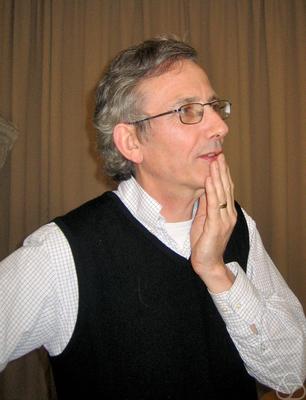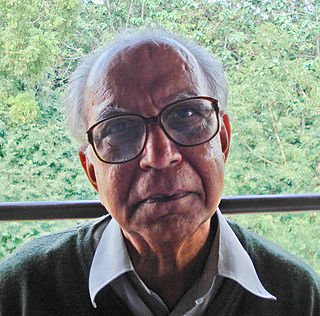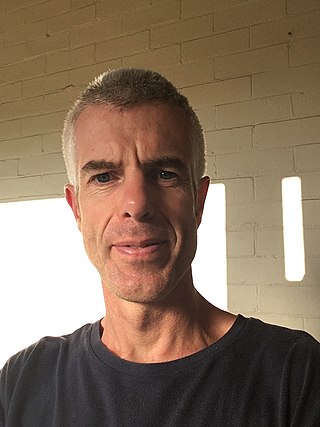Related Research Articles

Shiing-Shen Chern was a Chinese American mathematician and poet. He made fundamental contributions to differential geometry and topology. He has been called the "father of modern differential geometry" and is widely regarded as a leader in geometry and one of the greatest mathematicians of the twentieth century, winning numerous awards and recognition including the Wolf Prize and the inaugural Shaw Prize. In memory of Shiing-Shen Chern, the International Mathematical Union established the Chern Medal in 2010 to recognize "an individual whose accomplishments warrant the highest level of recognition for outstanding achievements in the field of mathematics."
Sergei Petrovich Novikov was a Soviet and Russian mathematician, noted for work in both algebraic topology and soliton theory. He became the first Soviet mathematician to receive the Fields Medal in 1970.

Sir Simon Kirwan Donaldson is an English mathematician known for his work on the topology of smooth (differentiable) four-dimensional manifolds, Donaldson–Thomas theory, and his contributions to Kähler geometry. He is currently a permanent member of the Simons Center for Geometry and Physics at Stony Brook University in New York, and a Professor in Pure Mathematics at Imperial College London.

Nigel James Hitchin FRS is a British mathematician working in the fields of differential geometry, gauge theory, algebraic geometry, and mathematical physics. He is a Professor Emeritus of Mathematics at the University of Oxford.

Clifford Henry Taubes is the William Petschek Professor of Mathematics at Harvard University and works in gauge field theory, differential geometry, and low-dimensional topology. His brother is the journalist Gary Taubes.

Mudumbai Seshachalu NarasimhanFRS was an Indian mathematician. His focus areas included number theory, algebraic geometry, representation theory, and partial differential equations. He was a pioneer in the study of moduli spaces of holomorphic vector bundles on projective varieties. His work is considered the foundation for Kobayashi–Hitchin correspondence that links differential geometry and algebraic geometry of vector bundles over complex manifolds. He was also known for his collaboration with mathematician C. S. Seshadri, for their proof of the Narasimhan–Seshadri theorem which proved the necessary conditions for stable vector bundles on a Riemann surface.
The Oswald Veblen Prize in Geometry is an award granted by the American Mathematical Society for notable research in geometry or topology. It was funded in 1961 in memory of Oswald Veblen and first issued in 1964. The Veblen Prize is now worth US$5000, and is awarded every three years.

Dennis Parnell Sullivan is an American mathematician known for his work in algebraic topology, geometric topology, and dynamical systems. He holds the Albert Einstein Chair at the Graduate Center of the City University of New York and is a distinguished professor at Stony Brook University.

Dame Frances Clare Kirwan, is a British mathematician, currently Savilian Professor of Geometry at the University of Oxford. Her fields of specialisation are algebraic and symplectic geometry.
The Geometry Festival is an annual mathematics conference held in the United States.

Michael Jerome Hopkins is an American mathematician known for work in algebraic topology.

Thomas Andrew Bridgeland is a Professor of Mathematics at the University of Sheffield. He was a senior research fellow in 2011–2013 at All Souls College, Oxford and, since 2013, remains as a Quondam Fellow. He is most well-known for defining Bridgeland stability conditions on triangulated categories.

Paul Seidel is a Swiss-Italian mathematician specializing in homological mirror symmetry. He is a faculty member at the Massachusetts Institute of Technology.
Minhyong Kim (Korean: 김민형) is a South Korean mathematician who specialises in arithmetic geometry and anabelian geometry.

Richard Paul Winsley Thomas is a British mathematician working in several areas of geometry. He is a professor at Imperial College London. He studies moduli problems in algebraic geometry, and ‘mirror symmetry’—a phenomenon in pure mathematics predicted by string theory in theoretical physics.
Claudio Procesi is an Italian mathematician, known for works in algebra and representation theory.
David Robert Morrison is an American mathematician and theoretical physicist. He works on string theory and algebraic geometry, especially its relations to theoretical physics.
Ana Caraiani is a Romanian-American mathematician, who is a Royal Society University Research Fellow and Hausdorff Chair at the University of Bonn. Her research interests include algebraic number theory and the Langlands program.
Xenia de la Ossa Osegueda is a theoretical physicist whose research focuses on mathematical structures that arise in string theory. She is a professor at Oxford's Mathematical Institute.
Catherine Meusburger is an Austrian mathematician and physicist. She works at the interface between mathematical physics, algebra and geometry. Since 2011 she has served as professor of mathematics at the University of Erlangen-Nuremberg.
References
- ↑ "Dr Soheyla Feyzbakhsh", Experts, Imperial College London, retrieved 2024-06-29
- 1 2 3 4 5 Kwan, Jacklin (20 May 2024), "Imperial mathematician wins major prizes for advances in algebraic geometry", Imperial News, Imperial College London, retrieved 2024-06-29
- 1 2 3 "Announcement of the Dubrovin Medal Winners for 2024", Letters in Mathematical Physics, 2024
- 1 2 3 4 Curriculum vitae , retrieved 2024-06-29
- 1 2 3 ICTP Alumna Success: Mathematician Soheyla Feyzbakhsh awarded Boris Dubrovin medal, International Centre for Theoretical Physics, 5 June 2024, retrieved 2024-06-29
- ↑ Soheyla Feyzbakhsh at the Mathematics Genealogy Project
- ↑ 2023 LMS Prize Winners, London Mathematical Society, 2024, retrieved 2024-06-29
- ↑ Adams Prize Winner 2023-24, University of Cambridge Faculty of Mathematics, retrieved 2024-06-29
- ↑ Oswald Veblen Prize in Geometry 2025